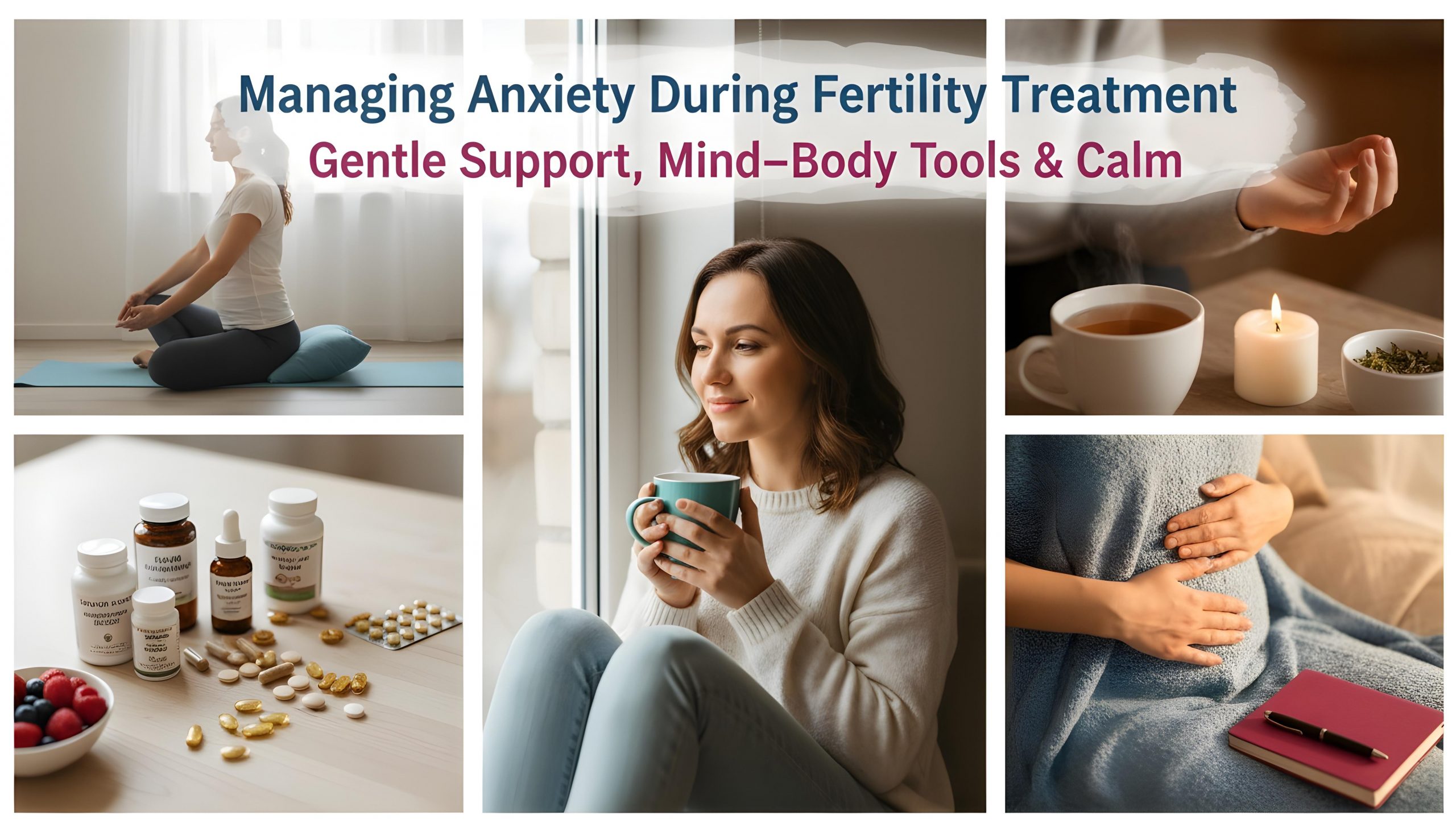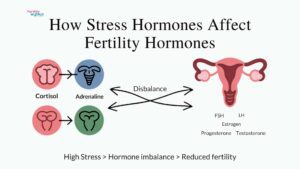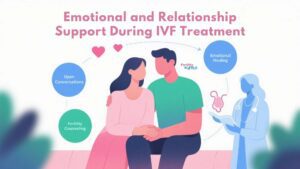Doesn’t the stress of fertility treatment sometimes feel worse than the medication itself? Take a deep breath. You’re not the only one who has been thinking why your heart feels so full or if stress is hurting your chances. You deserve to feel better during your fertility treatment, and there are gentle ways to do that.
And if you want to manage it with real guidance, you can book a free consultation here: +919311850412
Introduction
It’s like a small prayer every time I get a shot. Every two weeks feels like forever. What about every negative test? It breaks something inside you, not just makes you sad. You are getting more than just treatment for infertility. It makes your heart hurt. Feeling worried when you wake up. You go to sleep thinking about every choice you made. Fertility treatment isn’t just happening to your body. And somewhere in the exhaustion, you wonder: “Is my stress making this worse? It’s not working. Am I the problem?” If you’re going through it, managing stress and anxiety during fertility treatment is more than just “staying positive.” It’s survival. And yes, stress and fertility are connected.
Chronic anxiety affects your hormones, sleep, and how your body responds to treatment. Can stress keep you from getting pregnant? It’s not the whole story, but fertility treatment stress matters more than people realise.
But you need to hear this: You are not the problem. Your feelings are valid. Your tiredness is real. You need to relax and take care of your mental health during fertility treatment, which is a sign, but it shows courage. There should be peace for you in this storm.
Connect With Our Fertility World Specialists Today
Free consultation: +91 9311850412 | Email: info@fertilityworld.in
Understanding Stress During Fertility Treatment
It’s easy to get stressed out when you’re trying to get pregnant or going through IVF. Sometimes you don’t even realise it. Each change in your feelings, the time you have to wait, and the “what ifs” hurt your body and heart. If you know the stress and infertility connection, you can take kind steps to get back to a state of balance.
How Stress Affects the Reproductive System
It’s surprising how much stress can affect fertility. When you are worried, your body makes cortisol and adrenaline, which can mess up hormones that help with reproduction, such as FSH, LH, estrogen, progesterone, and others. These hormones help eggs grow, ovulate, and stick to the uterus correctly. Your body reacts to worry in the same way that your mind does. How it works:
| What Happens | How It Affects Fertility |
|---|---|
| Stress hormones (cortisol & adrenaline) rise | They disrupt reproductive hormones like FSH, LH & progesterone |
| Ovulation becomes irregular | Eggs may not mature or release properly |
| Sperm quality decreases | Stress impacts motility and count |
| Uterine blood flow reduces | Implantation can become more difficult |
Stress may not “stop” pregnancy by itself, but it can make it harder for your body to work at its best, especially during IVF treatments.
The Emotional Rollercoaster of IVF
The psychological effects of IVF might be as strong as the physical ones. Each step, from getting shots to waiting for test results, brings new feelings. It’s normal to feel like your heart is always flipping between hope and worry.
Here’s what couples commonly go through:
- Fear of failure: “Does stress affect my ability to have children?”
- Emotional exhaustion: Because of all the appointments and hormone changes.
- Waiting for two weeks: When anxiety is at its worst.
- Mood swings: a mix of stress, hormones, and pressure that isn’t expressed.
If you’ve ever wondered, “Can stress make women infertile?” or “Can stress make it hard to get pregnant?” Please understand that this isn’t about blaming anyone. Stress doesn’t make pregnancy impossible; it only means that your body and heart need a little extra care, rest, and understanding.
Common Emotional Challenges During Fertility Treatment
No one tells you how emotionally hard fertility therapy will be. One day you feel hopeful, and the next you want to cry. It’s not only the hormones; it’s the constant waiting, the not knowing, and the strong desire to see those two pink lines.
It’s typical for your feelings to change quickly after IVF or other reproductive treatments. If you know what these sensations are, you can deal with them in a way that is kinder to yourself and your relationship. Many people go through an experience like this:
| Emotion | What Causes It | How It Feels / Impacts You |
|---|---|---|
| Anxiety | The endless waiting for results | Racing thoughts, restlessness, sleepless nights |
| Guilt | Feeling responsible for infertility | Self-blame, pulling away from loved ones |
| Depression | Coping with failed IVF or repeated cycles | Feeling numb, losing hope, tears that come out of nowhere |
| Relationship Tension | Stress, pressure, and unspoken expectations | Arguments, emotional distance, misunderstandings |
| Fear | Worrying about the future or another failed attempt | Feeling drained, mentally burnt out, afraid to hope again |
Remember that you’re not the only one who has felt any of these things. IVF does have real and valid emotional side effects. Your heart and patience are also put to the test when you have trouble getting pregnant.
To be honest, though, recognising these feelings is the first thing that needs to be done to heal. Remember that you don’t have to hold it all in if you’re going through infertility sadness, dealing with a failed IVF, or just feeling strong. Allow yourself time, care, and understanding for how you think.
Signs That Stress May Be Affecting Your Fertility
Your body may tell you what your heart hasn’t said out loud: you’re tired or stressed, and it’s okay to take a break. As you try to get pregnant or go through IVF, you feel a mix of hope and worry. A lot of people don’t know this, but stress affects fertility than we usually think.
If you’ve been wondering why your body feels “off” and why rest doesn’t seem to help, it could be your hormones. Your body could be telling you that it’s nervous. Here are a few common signs of stress affecting fertility that you should pay attention to:
| Physical Signs | Emotional Signs |
|---|---|
| Irregular or missed periods | Constant worry or overthinking |
| Trouble sleeping or vivid dreams | Mood swings that come out of nowhere |
| Persistent headaches or fatigue | Feeling disconnected or lonely |
| Upset stomach or digestive issues | Losing motivation or hope |
| Low sex drive | Avoiding people or emotional closeness |
Don’t blame yourself if you’ve noticed any of these while trying to get pregnant. It’s not that your body is failing you; it’s just too busy. S Stress hormones like cortisol can intervene with the process of ovulation, sperm production, and even the implantation of an egg. The good news is that your body can get better. Does stress impact fertility? Yes, it does, but it only needs some time, peace, and care.
Just remember to take a deep breath the next time you feel antsy or worried. Get away from the need to be perfect. That’s enough, you’re doing your best. You don’t have to be calm all the time to deal with the stress of getting pregnant. Instead, listen to your body, let go of guilt, and remember that peace is part of the fertility path.
Mind-Body Techniques to Manage Fertility Stress Naturally
We get it, going through fertility treatment can be a lot to handle. The mental stress quickly rises as you have appointments, injections, and wait for results. One question you might have is, “Does stress affect fertility?” or “Can stress make it harder to get pregnant?“
There is a strong link between stress and fertility; that much is true. But there is good news: there are easy mind-body fertility techniques that can help you relax your body and mind. These techniques can help you breathe better and feel more grounded while you are going through IVF or TTC.
1. Deep Breathing & Fertility Meditation
Your breath gets short and your body tenses up when you’re anxious. Slow breathing restarts your hormones and lowers cortisol, which is a stress hormone that has been linked to ovulation problems.
Try this:
- Sit comfortably, close your eyes, and take a deep breath in for 4 counts.
- Hold it for 2.
- Exhale slowly for 6.
- Repeat for 5–10 minutes.
2. Gentle Yoga and Movement
When you’re stressed, your shoulders, back, and even belly get tight. Gentle yoga eases that stress, brings more blood to your reproductive systems, and makes your hormones work better together.
You can try Children’s Pose, Butterfly Pose, and Legs-Up-the-Wall, which are some yoga poses that can help with natural stress relief during IVF and fertility anxiety. Doing slow yoga for just 15 minutes a day can help your body feel more grounded and have the energy to get pregnant.
3. Journaling Your Journey
You can only hold so much in your mind before it gets too full. You can get rid of the weight of your dreams, fears, and waiting by writing. It is one of the best ways to deal with fertility anxiety and get your feelings straight.
For example, try these questions:
- It’s my choice today to be kind to myself.
- “The things that bother me don’t hurt my body.”
- “Let go of the things I can’t control right now.”
Remember that you only need to be honest and not worry about how well you write. Do your best to breathe. You need to make yourself calm, happy, and ready.
4. Guided Visualization
Imagine that your journey goes well and that you feel strong. Meditation can help you get pregnant because it makes you mentally stronger and strengthens the connection between your mind and body.
You should be proud of how strong and capable your body is. Think about how things will go for you. Your mind can believe anything when you tell it to.
Nutrition and Vitamins That Support Calmness
Stress can slowly drain your energy and feelings when you’re trying to get pregnant. But there is good news: the right fertility nutrition can help you stay calm, focused, and mentally balanced.
Have you ever thought about why a healthy meal makes you feel better right away? That’s how your body reacts to foods that help your nerves and hormones. Let’s look at some easy anti-stress foods for fertility that are good for the body and mind.
| Nutrient | Function | Sources |
|---|---|---|
| Vitamin B Complex | Boosts mood and energy | Eggs, lentils, leafy greens |
| Magnesium | Calms nerves and muscles | Bananas, almonds, spinach |
| Omega-3 Fatty Acids | Reduces stress and inflammation | Salmon, chia seeds, walnuts |
| Vitamin D | Balances mood & fertility hormones | Sunlight, fortified milk |
| Zinc | Supports hormones & mental clarity | Seeds, beans, seafood |
Taking these vitamins for emotional balance can help you lower your stress, get pregnant, and bring a gentle calm to your journey, one meal at a time.
Lifestyle Adjustments to Manage Fertility Stress
Trying to get pregnant can feel like a full-time job at times, with no breaks and too much thinking! During IVF or TTC, it’s important to learn how to deal with stress because of all the meetings, Google searches, and two-week waits. Keep your health (and sense of humour) by following these steps:
1. Create a Daily Routine
Restful sleep and a steady schedule are good for your body. Set small goals, like drinking water, going for short walks, breathing, stretching, and so on. Simply enough to tell your brain, “Hey, I got this.”
Helpful hint: Plan time to do nothing. You can count it as self-care!
2. Limit Screen Time and Stop the Scroll
If you’ve ever been crying at midnight over someone’s IVF success story, put down the phone!
Online comparisons can make you feel tense. Spend that time watching a show that makes you feel good, meditating, or calling someone who makes you laugh.
3. Prioritise Rest and Sleep
Keep saying it: sleep is good for getting pregnant!
Getting a good night’s sleep helps keep hormones in check and reduces stress. No screens before bed, herbal teas, and cosy socks—your eggs will thank you.
4. Practice Gratitude and Affirmations
Saying “My time will come” over and over is better than saying “What if it doesn’t work?” Your brain and mood change when you’re grateful. Each day, write down one good thing, even if it’s just “Today I didn’t cry.” This is a win.
Emotional and Relationship Support During IVF Treatment
During your fertility treatment, you may feel lonely, as you will be going through many things, and you will need the help of someone at that stage. That person will help you recover from stress from infertility. The endless tests, hormonal shifts, and waiting can make stress and infertility feel heavier than ever. But you don’t have to go through it alone.
If you have someone you care about, lean on them. Their support can help you feel better. If you don’t, a fertility counsellor can help you deal with IVF anxiety and relationship stress during therapy. Remember, it’s just as important to heal your mind as it is to heal your body. You deserve peace, comfort, and hope at every turn of this path.
1. Communicate Openly With Your Partner
If you and your partner can’t have kids, it can test your bond and make it stronger. Tell the truth about how you feel, even if it makes you feel bad.
Instead of “You don’t get it,” say “I’m worried.” Do not forget that you are fighting with each other, not against each other. Ask them, “What’s been really hard for you lately?” It makes room for people to understand instead of being quiet.
2. Seek Counselling or Support Groups
Couples who are trying to conceive can deal with stress, worry, and depression with the help of fertility counselling.
- A counsellor can help you deal with worries and sadness.
- Support groups tell you that other people understand your struggles and admire your strength.
- Talking helps people get better, and it also makes IVF relationship stress easier on the emotions.
- It’s okay if some people don’t understand your journey to get pregnant.
- Share only with people who make you feel calm, not stressed.
- Keep your energy and emotions in check.
- No one else’s view is more important than your peace.
| Support Type | Benefit | Where to Find It |
|---|---|---|
| Partner Communication | Builds trust & reduces IVF stress | Daily honest talks |
| Fertility Counseling | Relieves depression & anxiety | IVF clinics, online therapy |
| Support Groups | Encouragement & hope | Resolve.org, TTC forums |
| Family Support | Emotional reassurance | Close circle only |
Medical and Professional Support Options
To feel like you have to be strong all by yourself while going through fertility treatment is normal. It’s not a sign of weakness to get fertility treatment or emotional support during IVF. It’s a brave and selfless thing to do.
Mind-body fertility care is now available at many fertility centres. This type of care combines counselling, meditation, and acupuncture to help your mind and body feel calm and balanced. These treatments can help lower stress hormones and ease anxiety for better IVF results.
Cognitive Behavioral Therapy (CBT) with a therapist can help calm your anxious thoughts, and acupuncture can lower cortisol levels and help you rest. These gentle methods will help you feel less stressed and also help with your sexual health.
If you are facing anxiety during infertility, don’t forget that you don’t have to go through it. Always close by are hope, healing, and love. Always close by are hope, healing, and love.
Managing the Two-Week Wait — The Most Stressful Phase
The two-week wait after embryo transfer may feel like the longest time in your fertility journey. Every little symptom makes you think too much, and even the quietest moments feel like they are full of doubt. If the thought of having to wait two weeks or for IVF makes you feel stressed, know that you’re not the only one.
- This time of year can be hard on your emotions, but here are some careful steps you can take to make it easier to deal with:
- Do something relaxing like reading, painting, or going for short walks. Stress and conception worry can be lowered by doing things that make you feel calm.
- It’s normal for your body to feel different after transfer, so don’t worry too much about each sign. Don’t let it make you worry more.
- Do not test too soon, as it can lead to sadness that is not necessary.
- Every day, write in a gratitude journal. Instead of focusing on fear, think about peace, hope, and progress.
You are doing a great job. You should trust your body, your doctor, and the wonderful process of trying to get pregnant (TTC). Your time will come.
What to Do After a Failed Cycle
We know how heartbreaking a failed IVF cycle can feel. Hearing “not this time” after weeks of hope, shots, and waiting can make you feel like you’ve lost everything. But know that this is only a break and not the end. Many people have been where you are and come back stronger.
| Step | What It Means | Why It Helps |
|---|---|---|
| 1. Grieve Freely | Cry, talk, or write it out. | Letting it out helps you release pain. |
| 2. Take a Break | Rest before your next plan. | Your body & hormones need recovery. |
| 3. Refocus on You | Eat well, walk, breathe. | Small habits rebuild energy & calm. |
| 4. Practice Kindness | Avoid self-blame. | You did your best — and that matters. |
When to Seek Professional Help
It’s okay for the sadness to stay for a while. Reaching out for fertility stress counselling can help lighten the load if worry or depression makes it hard to get pregnant.
Get help if you see:
- Being sad or worried for more than two weeks.
- You’re pulling away from people you care about.
- Having trouble concentrating, sleeping, or eating.
- You feel lost or tired all the time.
You can get through the feelings of not being able to have children with the help of Fertility counselling or psychological support during IVF. This can help you find hope again. You don’t have to go through this by yourself. Taking one brave step forward will help you get better.
Final Thoughts
You are already very strong because you are reading this. There is a real link between stress and infertility. Your mind and body are more connected than you think. Once you start taking care of both, they will heal.
Yes, it can feel hard to get away from stress while trying to conceive, but your body can heal and your hope can grow again with time, gentle self-care, and the right support. Don’t forget that your journey isn’t just about medications. It’s also about how strong your heart is, how brave you are, and how determined you are to keep going.
Fertility World guidance can help you get back to a place of calm, clarity, and confidence after IVF. You don’t have to go through this alone.
How can I calm my mind during IVF?
Deep breathing, taking slow walks, journaling in a notebook, or talking to someone who gets it are all good ideas. Every day, little calm times add up to a big difference.
What is the best stress relief technique during fertility treatment?
Do whatever makes you feel grounded, like yoga, meditation, music, or arts and crafts. Pick something that makes your heart feel better as well as your mind.
Can meditation improve fertility?
Yes. Meditation lowers stress, keeps hormones in balance, and helps with mental healing during IVF and pregnancy.
Is therapy helpful for fertility anxiety?
Of course. Counseling for fertility can help you deal with worry, fear, and the pressure of IVF in a healthy way.








